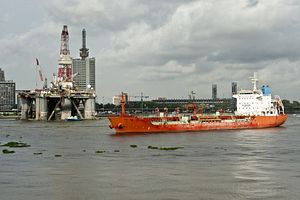Developers in the pursuit of commercially available oil found it in Nigeria in 1956, with the country’s first oil field beginning production in 1958. The last 56 years have seen Nigeria oil production surge to 2.524 million barrels per day and the country join OPEC, but the last five decades have also seen most Nigerians denied the benefits of the nation’s cash inflow, as a succession of corrupt military and civilian administrations raided the income, by some estimates of over a half trillion dollars.
However, the gravy train is unlikely to stop soon.
As of 2000, oil and gas exports accounted for more than 98 percent of export earnings and about 83 percent of federal government revenue, as well as generating more than 14 percent of its GDP. The U.S. government’s Energy Information Administration estimates Nigeria’s oil reserves at between 16 and 22 billion barrels, adding that “Nigeria is the largest oil producer in Africa and was the world’s fourth leading exporter of LNG in 2012…Major international players in Nigeria’s oil and natural gas sectors are Shell, ExxonMobil, Chevron, Total, and Eni. International oil companies participating in onshore and shallow water oil projects in the Niger Delta region have been affected by the instability in the region. As a result, there has been a general trend for IOCs to sell their interests in onshore oil projects. Nigeria has the second largest amount of proven crude oil reserves in Africa, but reserve estimates have been stagnant as exploration activity has been low. Rising security problems coupled with regulatory uncertainty have contributed to decreased exploration activity.”
Well, never mind the experiences of Shell, ExxonMobil, Chevron, Total and Eni, Chinese companies are willing to brave the Nigerian new frontier and invest onshore there. On January 10, the federal government in Abuja approved a $10 billion in Chinese oil exploration in the Bida Basin.
According to Niger State commissioner of mining and mineral resources Engr Abubakar Baba Jibreel, “The Department of Petroleum Resources (DPR) has started the study of the presentation and a five-man Chinese delegation has met with the experts from the DPR and the experts are scheduled to visit the state before the end of this month.”
Jibreel noted that while five foreign firms have indicated interest in investing in the oil exploration in the basin, a Chinese firm has agreed to invest over $10 billion in the exploration and exploitation of oil and gas in Bida Basin, commenting, “We want to tell those who doubt that there is oil in Niger State to stop and join in the effort to make it flow. In fact, it is from Niger State that oil flowed to Niger Delta where we are exploiting it today. We should not also forget that if Chad and Sudan can have oil in large quantity, it is more possible to have oil in the northern part of Nigeria.”
Even better, the unnamed Chinese firm has also indicated its interest in constructing a refinery in Baro, Niger State.
The good news is that laboratory studies for hydrocarbon deposits in the Bida Basin revealed that there was about a 70 percent gas and 30 percent oil composition.
The bad news is, as always, the current Nigerian environment, rife with corruption.
Will China be able to surmount the issues of production and corruption that have tormented foreign oil companies up to now? No doubt, a $10 billion potential investment when European and American firms are giving Nigeria a pass will produce a great deal of influence for Beijing.
Can China surmount the problems that have dogged Western oil firms operating in Nigeria? Given Beijing’s deep pockets, if such difficulties can be bought off, then China’s options are the best of any energy firms entering the chaotic Nigerian market for some time.
This article was originally published at OilPrice.com. It is reprinted with permission.
































